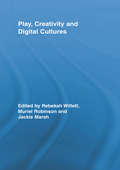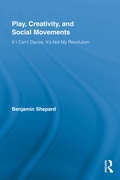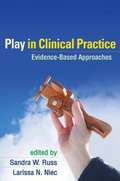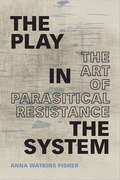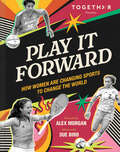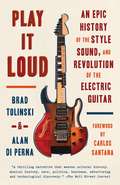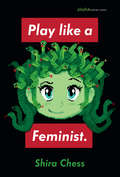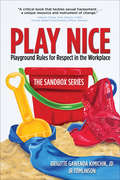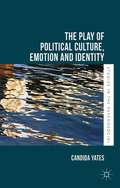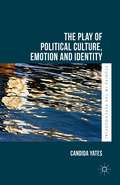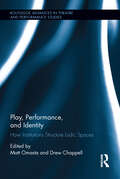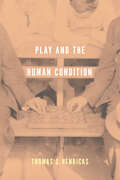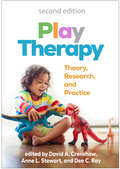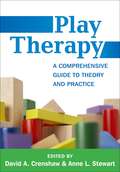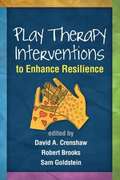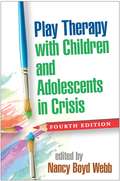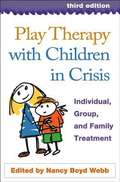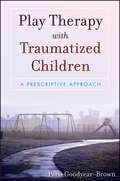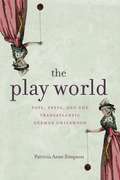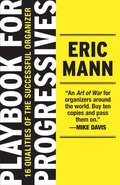- Table View
- List View
Play, Creativity and Digital Cultures (Routledge Research in Education)
by Muriel Robinson Jackie Marsh Rebekah WillettRecent work on children's digital cultures has identified a range of literacies emerging through children's engagement with new media technologies. This edited collection focuses on children's digital cultures, specifically examining the role of play and creativity in learning with these new technologies. The chapters in this book were contributed by an international range of respected researchers, who seek to extend our understandings of children's interactions with new media, both within and outside of school. They address and provide evidence for continuing debates around the following questions: What notions of creativity are useful in our fields? How does an understanding of play inform analysis of children's engagement with digital cultures? How might school practice take account of out-of-school learning in relation to digital cultures? How can we understand children's engagements with digital technologies in commercialized spaces? Offering current research, theoretical debate and empirical studies, this intriguing text will challenge the thinking of scholars and teachers alike as it explores the evolving nature of play within the media landscape of the twenty-first century.
Play, Creativity, and Social Movements: If I Can't Dance, It’s Not My Revolution (Routledge Advances in Sociology)
by Benjamin ShepardAs we play, we step away from stark reality to conjure up new possibilities for the present and our common future. Today, a new cohort of social activists are using it to create social change and reinvent democratic social relations. In contrast to work or routine, play must be free. To the extent that it is, it infuses a high-octane burst of innovation into any number of organizational practices and contexts, and invites social actors to participate in a low-threshold, highly democratic process of collaboration, based on pleasure and convivial social relations. Despite the contention that such activities are counterproductive, movements continue to put the right to party on the table as a part of a larger process of social change, as humor and pleasure disrupt monotony, while disarming systems of power. Through this book, Shepard explores notions of play as a social movement activity, considering some of the meanings, applications and history of the concept in relation to social movement groups ranging from Dada and Surrealism to Situationism, the Yippies to the Young Lords, ACT UP to the Global Justice, anti-gentrification, community and anti-war movements of recent years.
Play in Clinical Practice
by Sandra Russ Larissa NiecGoing beyond traditional play therapy, this innovative book presents a range of evidence-based assessment and intervention approaches that incorporate play as a key element. It is grounded in the latest knowledge about the importance of play in child development. Leading experts describe effective strategies for addressing a wide variety of clinical concerns, including behavioral difficulties, anxiety, parent child relationship issues, trauma, and autism. The empirical support for each approach is summarized and clinical techniques are illustrated. The book also discusses school-based prevention programs that utilize play to support children's learning and social-emotional functioning.
Play in Healthcare for Adults: Using play to promote health and wellbeing across the adult lifespan
by Alison Tonkin Julia WhitakerPLAY. We all do it: wordplay, love play, role-play; we play cards, play sport, play the fool, and play around. And that’s just the grown-ups! It features in every aspect of our lives, whether we call it by that or another name. We all do it, but why do we do it? What does it mean to play and what, if any, difference does it make to our lives? Most crucially, and central to the theme of this book, is the question, ‘Does play have a positive impact on our health and wellbeing, and consequently a role in modern healthcare delivery?’ The contributors to this book provide a comprehensive overview of how play and play-based activities can be used throughout the adult lifespan to promote health and wellbeing within the context of healthcare service delivery for patients, their families and communities, and for the staff involved in their care. Responding to current global health concerns such as obesity, coronary heart disease, dementia and mental health, the book argues that play and playfulness offer a means of protection, promotion and recovery of positive health and wellbeing. The human tendency for play and playfulness as essential to personal growth and development lie at the heart of the discussion. This book will be of interest to all those working in health or social care settings, including nursing, social work and allied health students and professionals and those working within the therapeutic disciplines of art therapy, music therapy, and recreation alliances.
The Play in the System: The Art of Parasitical Resistance
by Anna Watkins FisherWhat does artistic resistance look like in the twenty-first century, when disruption and dissent have been co-opted and commodified in ways that reinforce dominant systems? In The Play in the System Anna Watkins Fisher locates the possibility for resistance in artists who embrace parasitism—tactics of complicity that effect subversion from within hegemonic structures. Fisher tracks the ways in which artists on the margins—from hacker collectives like Ubermorgen to feminist writers and performers like Chris Kraus—have willfully abandoned the radical scripts of opposition and refusal long identified with anticapitalism and feminism. Space for resistance is found instead in the mutually, if unevenly, exploitative relations between dominant hosts giving only as much as required to appear generous and parasitical actors taking only as much as they can get away with. The irreverent and often troubling works that result raise necessary and difficult questions about the conditions for resistance and critique under neoliberalism today.
Play It Forward: How Women Changed Sports to Change the World
by TOGETHXREveryone Watches Women’s Sports New from TOGETHXR—the sports media company that coined the defining statement setting the sports world on fire—this inspiring collection of stories shines a light on the grit, smarts, and determination of record-setting and boundary-breaking female athletes around the world and across sports.Play It Forward features twenty‑five inspirational stories of badass women from all corners of the sports universe, curated by TOGETHXR, a sports media company founded by legends Sue Bird, Alex Morgan, Simone Manuel, and Chloe Kim. From profiles of professional athletes and Olympians at the top of their game to everyday women putting in the work without a crowd, these are true tales of fierce competitors, dedicated teammates, and passionate advocates who are all too accustomed to hearing the word “no.” Each story highlights an inspiring athlete or team who is defying expectations and rebelling against inequality in big and small ways, including: Indigenous women forming a softball team in Mexico Older women finding friendship and purpose through competitive swimming A woman mountain-climbing her way out of oppression in Afghanistan WNBA players developing a voice for social justice and influencing a pivotal election Incarcerated women playing soccer to prepare for life after release For sports fans of all ages, Play it Forward celebrates and elevates the gutsy true stories of activists and dreamers who are changing the game, and the world of sports, for the better.WORLD’S GREATEST ATHLETES: A foreword and afterword by world-class athletes and Olympians Alex Morgan and Sue Bird set the stage and offer key context for this inspirational collection of stories of women who are defying the odds and breaking the rules. STORIES FROM ACROSS WOMEN'S SPORTS: TOGETHXR created the viral sensation "Everyone Watches Women Sports" that caught fire during the record-breaking NCAA 2024 Women's Basketball Tournament. Their ongoing mission is to elevate women's sports coverage in a space where culture, activism, lifestyle, and sports converge. In this powerhouse book, TOGETHXR gathers celebrity and everyday stories to create a breadth of inspiration from powerful women across a range of sports, from basketball, soccer, and hockey to swimming, gymnastics, rowing, and professional bowling. CELEBRATION OF ATHLETES AT ALL AGES: These stories will appeal to generations of sports fans—from those who fought the early battles of Title IX to young women just lacing up their sneakers, ready to take on the world. ENGAGING JOURNALISM: The stories are contemporary and underreported features covering athletes and teams that will be new to many readers. The essays are all written by acclaimed female and nonbinary journalists from around the world. ULTIMATE GIFT FOR WOMEN: This is a perfect present for women to give women: mom to daughter, daughter to mom, grandmother to granddaughter, friend to friend, and many more.Perfect for: Athletes and sports enthusiasts Parents, coaches, teachers, mentors Viewers of college and pro sports, the Women's World Cup, and the Olympics Fans of books about current events, feminism, or strong women Readers of Strong is the New Pretty and the Rebel Girls series Birthday, Mother’s Day, holiday, or graduation gifts for teens and adults Resource for celebrating
Play It Loud: An Epic History of the Style, Sound, and Revolution of the Electric Guitar
by Brad Tolinski Carlos Santana Alan Di PernaAn unprecedented history of the electric guitar, its explosive impact on music and culture, and the players and builders who brought it to life For generations the electric guitar has been an international symbol of freedom, danger, rebellion, and hedonism. In Play It Loud, veteran music journalists Brad Tolinski and Alan di Perna bring the history of this iconic instrument to roaring life. It's a story of inventors and iconoclasts, of scam artists, prodigies, and mythologizers as varied and original as the instruments they spawned.Play It Loud uses twelve landmark guitars--each of them artistic milestones in their own right--to illustrate the conflict and passion the instruments have inspired. It introduces Leo Fender, a man who couldn't play a note but whose innovations helped transform the guitar into the explosive sound machine it is today. Some of the most significant social movements of the twentieth century are indebted to the guitar: It was an essential element in the fight for racial equality in the entertainment industry; a mirror to the rise of the teenager as social force; a linchpin of punk's sound and ethos. And today the guitar has come full circle, with contemporary titans such as Jack White of The White Stripes, Annie Clark (aka St. Vincent), and Dan Auerbach of The Black Keys bringing some of the earliest electric guitar forms back to the limelight.Featuring interviews with Les Paul, Keith Richards, Carlos Santana, Eddie Van Halen, Steve Vai, and dozens more players and creators, Play It Loud is the story of how a band of innovators transformed an idea into a revolution.From the Hardcover edition.
Play like a Feminist. (Playful Thinking)
by Shira ChessAn important new voice provides a riveting look at why video games need feminism and why all of us should make space for more play in our lives."You play like a girl": it's meant to be an insult, accusing a player of subpar, un-fun playing. If you're a girl, and you grow up, do you "play like a woman"--whatever that means? In this provocative and enlightening book, Shira Chess urges us to play like feminists. Furthermore, she urges us to play video games like feminists. Playing like a feminist is empowering and disruptive; it exceeds the boundaries of gender yet still advocates for gender equality. Feminism need video games as much as video games need feminism.
Play Matters (Playful Thinking)
by Miguel SicartWhy play is a productive, expressive way of being, a form of understanding, and a fundamental part of our well-being.What do we think about when we think about play? A pastime? Games? Childish activities? The opposite of work? Think again: If we are happy and well rested, we may approach even our daily tasks in a playful way, taking the attitude of play without the activity of play. So what, then, is play? In Play Matters, Miguel Sicart argues that to play is to be in the world; playing is a form of understanding what surrounds us and a way of engaging with others. Play goes beyond games; it is a mode of being human.We play games, but we also play with toys, on playgrounds, with technologies and design. Sicart proposes a theory of play that doesn't derive from a particular object or activity but is a portable tool for being—not tied to objects but brought by people to the complex interactions that form their daily lives. It is not separated from reality; it is part of it. It is pleasurable, but not necessarily fun. Play can be dangerous, addictive, and destructive.Along the way, Sicart considers playfulness, the capacity to use play outside the context of play; toys, the materialization of play—instruments but also play pals; playgrounds, play spaces that enable all kinds of play; beauty, the aesthetics of play through action; political play—from Maradona's goal against England in the 1986 World Cup to the hactivist activities of Anonymous; the political, aesthetic, and moral activity of game design; and why play and computers get along so well.
Play Nice: Playground Rules for Respect in the Workplace (The Sandbox Series)
by Brigitte Gawenda Kimichik JR TomlinsonAn accessible guide to understanding what qualifies as sexual harassment and how to combat it, using the simple rules children learn on the playground.One of today’s most hotly discussed topics is sexual harassment in the workplace: what it looks like, how to prevent it, and what to do about it. So many people don’t realize that they have been victims of sexual harassment or that they have a right to speak up and demand different treatment. Many don’t realize that they are committing it, thanks certain behaviors being dismissed, forgiven, or ignored for many years when they should have been corrected long ago. In the heat of today’s #MeToo movement, Brigitte Gawenda Kimichik, JD, and J.R Tomlinson take things back to basics by applying the rules we all learned on the playground to the modern-day workplace, thus making clear to everyone what is and what isn’t OK.Play Nice: Playground Rules for Respect in the Workplace is an indispensable resource—both for empowering those who wish to reassert their boundaries and for teaching allies how to help in this fight.Praise for Play Nice“Chock full of smart, strategic advice to help anyone suffering from toxic behavior in the workplace. When you finish this book, you will realize that equal rights for women is not some far-off ideal but a reality that that soon can be achieved.” —Skip Hollandsworth, Executive Editor, Texas Monthly“For real change to occur, it is imperative that we all start holding ourselves responsible for ensuring everyone is treated respectfully. Play Nice is a giant step in the right direction. This book should be mandatory reading for all organizations and parents.” —Vanessa FoxCorp. VP, Chief Development Officer, Jack in the Box“This is a must-read for any human resources executive, any woman embarking on her professional career, and any bystander (male or female) who is not sure what to do when faced with bad behavior.” —Joel L. Ross, former General Counsel of Trammell Crow Company and retired partner of Vinson & Elkins LLP
The Play of Political Culture, Emotion and Identity (Studies in the Psychosocial)
by Candida YatesOffering a uniquely 'psycho-cultural' take on the emotional dynamics of UK political culture this book uses theories and research in psychoanalysis, cultural and media studies and political sociology. It explores the cultural and emotional processes that shape our relationship to politics in a media age, referencing Joanna Lumley to Nigel Farage.
The Play of Political Culture, Emotion and Identity (Studies in the Psychosocial)
by Candida YatesOffering a uniquely 'psycho-cultural' take on the emotional dynamics of UK political culture this book uses theories and research in psychoanalysis, cultural and media studies and political sociology. It explores the cultural and emotional processes that shape our relationship to politics in a media age, referencing Joanna Lumley to Nigel Farage.
Play, Performance, and Identity: How Institutions Structure Ludic Spaces (Routledge Advances in Theatre & Performance Studies)
by Matt Omasta Drew ChappellPlay helps define who we are as human beings. However, many of the leisurely/ludic activities people participate in are created and governed by corporate entities with social, political, and business agendas. As such, it is critical that scholars understand and explicate the ideological underpinnings of played-through experiences and how they affect the player/performers who engage in them. This book explores how people play and why their play matters, with a particular interest in how ludic experiences are often constructed and controlled by the interests of institutions, including corporations, non-profit organizations, government agencies, religious organizations, and non-governmental organizations (NGOs). Each chapter explores diverse sites of play. From theme parks to comic conventions to massively-multiplayer online games, they probe what roles the designers of these experiences construct for players, and how such play might affect participants' identities and ideologies. Scholars of performance studies, leisure studies, media studies and sociology will find this book an essential reference when studying facets of play.
Play Reconsidered: Sociological Perspectives on Human Expression
by Thomas S. HenricksUnderstanding the significance of adult play in the life of modern societies Within the social sciences, few matters are as significant as the study of human play--or as neglected. In Play Reconsidered, rather than viewing play simply as a preoccupation of the young and a vehicle for skill development, Thomas S. Henricks argues that it’s a social and cultural phenomenon of adult life, enveloped by wider structures and processes of society. In that context, he argues that a truly sociological approach to play should begin with a consideration of the largely overlooked writings on play and play-related topics by some of the classic sociological thinkers of the twentieth century. Henricks explores Karl Marx’s analysis of creativity in human labor, examines Emile Durkheim’s observations on the role of ritual and the formation of collective consciousness, extends Max Weber’s ideas about the process of rationalization to the realm of expressive culture and play, surveys Georg Simmel’s distinctive approach to sociology and sociability, and discusses Erving Goffman’s focus on human conduct as process and play as “encounter.” These and other discussions of the contributions of more recent sociologists are framed by an initial consideration of Johan Huizinga’s famous challenge to understand the nature and significance of play. In a closing synthesis, Henricks distinguishes play from other forms of human social expression, particularly ritual, communitas, and work.
Play Therapy: Theory, Research, and Practice
by David A. Crenshaw Anne L. Stewart Dee C. RayNow in a significantly revised second edition featuring 85% new material, this authoritative play therapy reference and text comprehensively reviews the current state of the field. Expert contributors describe theoretical foundations, showcase widely used clinical approaches, and explore challenging and timely professional issues. The book presents vivid case illustrations and synthesizes the play therapy research base. Chapters on specific populations (such as neurodivergent children, culturally diverse children, adolescents) and clinical problems (such as trauma, disrupted attachment, anxiety) provide engaging course content and the knowledge therapists need to tailor interventions effectively. New to This Edition *Chapters on Gestalt play therapy, prescriptive play therapy, group play therapy, and nature-based play therapy. *Chapters on racial trauma, chronic illness, depression and suicidality, and attachment trauma. *Chapters on working with infants and parents, immigrant children and families, and LGBTQIA+ youth. *Chapters on telemental health, resilience, parent consultation, and working within child protection and legal systems. *Enhanced focus on research, with new coeditor Dee C. Ray bringing particular expertise.
Play Therapy
by Anne L. Stewart Stuart Brown David A. CrenshawThis authoritative work brings together leading play therapists to describe state-of-the-art clinical approaches and applications. The book explains major theoretical frameworks and summarizes the contemporary play therapy research base, including compelling findings from neuroscience. Contributors present effective strategies for treating children struggling with such problems as trauma, maltreatment, attachment difficulties, bullying, rage, grief, and autism spectrum disorder. Practice principles are brought to life in vivid case illustrations throughout the volume. Special topics include treatment of military families and play therapy interventions for adolescents and adults.
Play Therapy Interventions to Enhance Resilience
by David A. Crenshaw Robert Brooks Sam GoldsteinThe importance of therapeutic play in helping children recover from adversity has long been recognized. This unique volume brings together experts on resilience, trauma, and play therapy to describe effective treatment approaches in this key area. The book begins by providing guiding principles for intervention and describing the specific properties of play that promote resilience. Subsequent chapters delve into clinical applications, including such strategies as storytelling and metaphors, sand play, art therapy, play therapy adaptations for school settings, group interventions, and the use of therapeutic writing. Rich case studies and vignettes demonstrate creative ways to bolster at-risk children's strengths and enhance their natural capacity to thrive.
Play Therapy with Children and Adolescents in Crisis, Fourth Edition
by Nancy Boyd Webb MD Lenore C. TerrThis widely used practitioner resource and course text is considered the most comprehensive guide to working with children who have experienced major losses, family upheavals, violence in the school or community, and other traumatic events. Leading experts present a range of play and creative arts therapy techniques in chapters organized around in-depth case examples. Informed by the latest knowledge on crisis intervention and trauma, the book now encompasses work with adolescents as well as younger children. Each chapter concludes with instructive questions for study or reflection. New to This Edition *Expanded age range: now includes expressive therapy approaches for adolescents. *More attention to traumatic stress reactions and posttraumatic stress disorder (PTSD); several chapters address complex trauma. *Extensively revised with the latest theory, practices, and research; many new authors. *Additional topics: parental substance abuse, group work with adolescents, chronic medical conditions, animal-assisted play therapy and courtroom testimony, and more.
Play Therapy with Children in Crisis, Third Edition
by Nancy WebbHEOA Compliance Copy July 2011This practical casebook and widely adopted text presents effective, creative approaches to helping children who have experienced such stressful situations as parental death or divorce, abuse and neglect, violence in the school or community, and natural disasters. New to This Edition Incorporates advances in knowledge on crisis intervention, trauma, and short-term play therapy. 17 of the 21 chapters are entirely new. Additional topics parental military deployment, the impact of Hurricane Katrina on families, immigration-related trauma, terrorism, and disrupted adoption.
Play Therapy With Traumatized Children: A Prescriptive Approach
by Paris Goodyear-BrownIntroducing a practical model of play therapy for traumatized children Some of the most rewarding work a therapist can do is help a child recover from a traumatic event. But where to begin? A growing body of play therapy literature offers many specific techniques and a variety of theoretical models; however, many therapists are still searching for a comprehensive model of treatment that incorporates solid theoretical constructs with effective play therapy interventions. Clinicians have long recognized that trauma therapy is not just a matter of techniques but a journey with a beginning, middle, and end. In a pioneering contribution to the field, Play Therapy with Traumatized Children: A Prescriptive Approach, the author codifies the process in her model, Flexibly Sequential Play Therapy (FSPT). Integrating non-directive and directive approaches, this components-based model allows for the uniqueness of each child to be valued while providing a safe, systematic journey towards trauma resolution. The FSPT model demystifies play-based trauma treatment by outlining the scope and sequence of posttraumatic play therapy and providing detailed guidance for clinicians at each step of the process. Dramatically demonstrating the process of healing in case histories drawn from fifteen years of clinical practice with traumatized children, Play Therapy with Traumatized Children addresses: -Creating a safe place for trauma processing -Augmenting the child's adaptive coping strategies and soothing his or her physiology -Correcting the child's cognitive distortions -Ensuring that caregivers are facilitative partners in treatment Inviting gradual exposure to trauma content through play -Creating developmentally sensitive trauma narratives -Using termination to make positive meaning of the post-trauma self.
The Play World: Toys, Texts, and the Transatlantic German Childhood (Max Kade Research Institute: Germans Beyond Europe)
by Patricia Anne SimpsonThe Play World chronicles the history and evolution of the concept of play as a universal part of childhood. Examining texts and toys coming out of Europe between 1631 and 1914, Patricia Anne Simpson argues that German material, literary, and pedagogical cultures were central to the construction of the modern ideas and realities of play and childhood in the transatlantic world.With attention to the details of toy manufacturing and marketing, Simpson considers prescriptive texts about how children should play, treat their possessions, and experience adventure in the scientific exploration of distant geographies. She illuminates the role of toys—among them a mechanical guillotine, yo-yos, hybridized dolls, and circus figures—as agents of history. Using an interdisciplinary approach that draws from postcolonial, childhood, and migration studies, she makes the case that these texts and toys transfer the world of play into a space in which model childhoods are imagined and enacted as German. With chapters on the Protestant play ethic, enlightened parenting, Goethe as an advocate of play, colonial fantasies, children’s almanacs, ethnographic play, and an empire of toys, Simpson’s argument follows a compelling path toward understanding the reproduction of religious, gendered, ethnic, racial, national, and imperial identities, emanating from German-speaking Europe, that collectively construct a global imaginary.This foundational and deeply original study connects German-speaking communities across the Atlantic as they collectively engender the epistemology of the play world. It will be of particular interest to German studies scholars whose research crosses the Atlantic.
The Play World: Toys, Texts, and the Transatlantic German Childhood (Max Kade Research Institute)
by Patricia Anne SimpsonThe Play World chronicles the history and evolution of the concept of play as a universal part of childhood. Examining texts and toys coming out of Europe between 1631 and 1914, Patricia Anne Simpson argues that German material, literary, and pedagogical cultures were central to the construction of the modern ideas and realities of play and childhood in the transatlantic world.With attention to the details of toy manufacturing and marketing, Simpson considers prescriptive texts about how children should play, treat their possessions, and experience adventure in the scientific exploration of distant geographies. She illuminates the role of toys—among them a mechanical guillotine, yo-yos, hybridized dolls, and circus figures—as agents of history. Using an interdisciplinary approach that draws from postcolonial, childhood, and migration studies, she makes the case that these texts and toys transfer the world of play into a space in which model childhoods are imagined and enacted as German. With chapters on the Protestant play ethic, enlightened parenting, Goethe as an advocate of play, colonial fantasies, children’s almanacs, ethnographic play, and an empire of toys, Simpson’s argument follows a compelling path toward understanding the reproduction of religious, gendered, ethnic, racial, national, and imperial identities, emanating from German-speaking Europe, that collectively construct a global imaginary.This foundational and deeply original study connects German-speaking communities across the Atlantic as they collectively engender the epistemology of the play world. It will be of particular interest to German studies scholars whose research crosses the Atlantic.
Playa Fire: Spirit and Soul at Burning Man
by Stewart HarveyForeword by Burning Man founder Larry HarveyA stunning visual and narrative homage—featuring more than 100 black & white and color photographs, many never before seen—that captures the wonder and metaphysical power of Burning Man past present, and future, and the magic that draws us to it, by the ultimate Burning Man insider.Growing up in 1950s Oregon, brothers Stewart and Larry Harvey rebelled against their small-town culture and the conformist norms of Eisenhower’s America. Stewart turned to photography. Larry, drawn by the siren call of the burgeoning counter-cultural movement, fled to San Francisco, where he met a group of alternative artists like himself. During his frequent visits south, Stewart, camera always in hand, photographed the intimate creative worlds of Larry and his friends—images that would chronicle the birth of one of the most important cultural, artistic, and social movements of the twentieth century: Burning Man.Filled with the rare insights of Stewart’s decades-long friendships with his brother and the five other founders, as well as the many people who have shaped it, Playa Fire is a Burning Man story like no other. An artist and writer of striking emotional depth, Stewart marries stunning photos reflecting the beauty and grandeur of the desert landscape and the ephemeral, hallucinatory beauty of Black Rock City with a compelling narrative journey that captures the landmark festival’s spiritual essence.Drawn from his personal archives and taken over thirty years at Burning Man—many at "First Camp"—his panoramic photographs are accompanied by never-before-seen memorabilia, including Larry’s original sketch of the first Man as well as family photos of the young Harvey brothers and their band of merrymakers. An exquisite work of art that embodies the radical imagination at the core of this transformative event, Playa Fire celebrates both the spectacle and the meditative that is Burning Man. It is an enchanting portrait for die-hard "Burners," arts enthusiasts, and the intellectually curious fascinated by this iconoclastic, beloved cultural phenomenon.
Playbook for Progressives: 16 Qualities of a Successful Organizer
by Eric MannAn organizing manifesto for the twenty-first century, Playbook for Progressives is a must-have for the activist's tool kit. This comprehensive guide articulates pragmatically what is required in the often mystifying and rarely explained on-the-ground practice of organizing. Here, Eric Mann distills lessons he learned from over forty years as an organizer, as well as from other organizers within the civil rights, labor, LGBT, economic justice, and environmental movements.
Playbook for Progressives
by Eric MannAn organizing manifesto for the twenty-first century, Playbook for Progressives is a must-have for the activist's tool kit. This comprehensive guide articulates pragmatically what is required in the often mystifying and rarely explained on-the-ground practice of organizing. Here, Eric Mann distills lessons he learned from over forty years as an organizer, as well as from other organizers within the civil rights, labor, LGBT, economic justice, and environmental movements.From the Trade Paperback edition.
